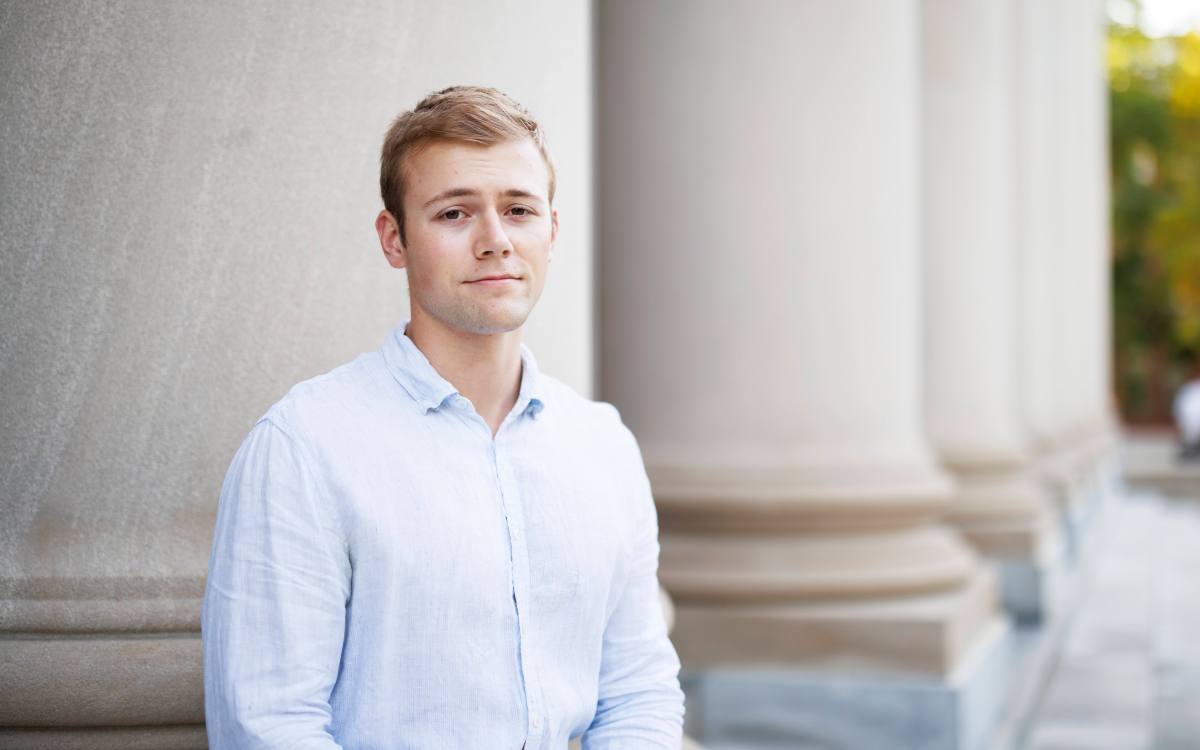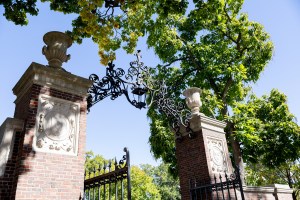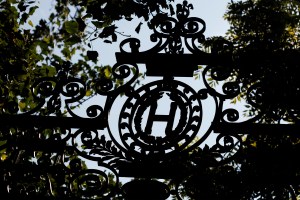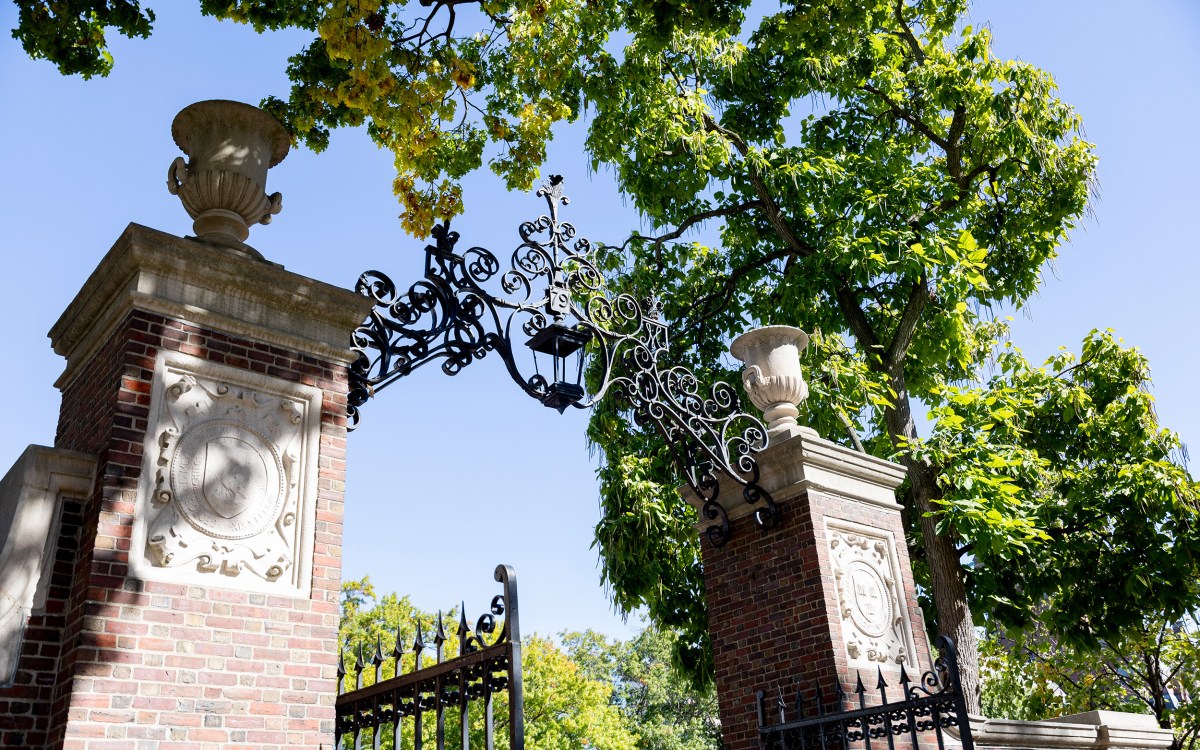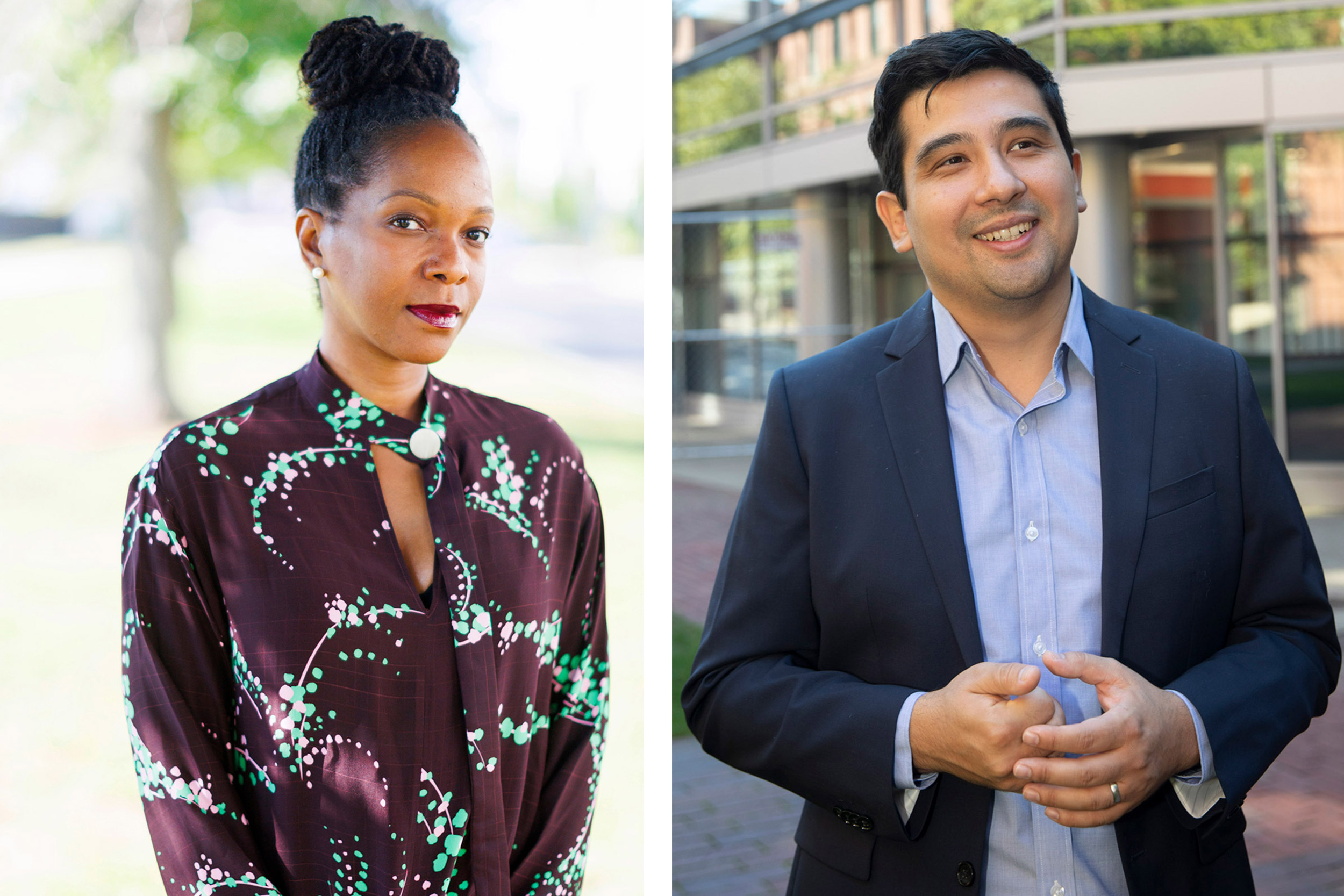
Imani Perry and Jason Buenrostro have been named MacArthur Fellows.
Photos by Stephanie Mitchell (left) and Kris Snibbe/Harvard Staff Photographers
Imani Perry, Jason Buenrostro land MacArthur ‘genius grants’
One for interdisciplinary interpretations on history, culture of Black America, the other for pathbreaking technologies to advance study of gene expression
One produces richly detailed interpretations of Black America’s past and present, the other pathbreaking technologies that further understanding of gene expression. Today, two professors in the Faculty of Arts and Sciences were named as recipients of the John D. and Catherine T. MacArthur Foundation’s 2023 “genius grant.”
Imani Perry, the Henry A. Morss Jr. and Elisabeth W. Morss Professor of Studies of Women, Gender, and Sexuality and of African and African American Studies, is a multidisciplinary thinker recognized for her fresh insights on the resilience and beauty of Black American cultural expressions. Jason Buenrostro, an associate professor in the Department of Stem Cell and Regenerative Biology, won for developing powerful new technologies that provide detailed views — right down to the single cell — of which genes get turned on and off in various contexts.
Buenrostro, a son of Mexican American immigrants and the first in his family to attend college, was “absolutely floored” to learn of receiving the MacArthur Fellowship. “This is something incredibly special and unique, that I’m incredibly grateful to receive,” he said.
“It took a while to sink in,” said Perry, whose connections to Harvard began at an early age as her mother pursued a doctorate at the Graduate School of Education. “I find myself on a regular basis feeling grateful that I get to do work that brings me joy and sense of purpose. So, to have it recognized and appreciated is just amazing.”
For Perry, who is also the Carol K. Pforzheimer Professor at Harvard Radcliffe Institute, the MacArthur is the latest in a recent string of honors. In 2021, the scholar, artist, and writer was named a Guggenheim Fellow. She then won the 2022 National Book Award for Nonfiction for “South to America: A Journey Below the Mason-Dixon to Understand the Soul of a Nation,” an exhaustively researched book blending travelogue, memoir, history, and social analysis.
“I love how people have embraced that book,” Perry noted. “I hope it’s a pathway to some of my more historical work like ‘May We Forever Stand’ [her 2018 history of the song ‘Lift Every Voice and Sing’] as well as some of the more theoretical work like ‘Vexy Thing’ [an excavation of modern patriarchy also from 2018]. They’re more conventionally academic, but they are without question precursors.”
Perry, a contributor to The Atlantic and author of eight books, including recent releases “A Dangerously High Threshold for Pain” (2023) and “Breathe: A Letter to My Sons” (2019), is at work on the forthcoming “Black in Blues,” which will explore the history of Black identity in relation to the color blue. Perry studied American Studies and Literature as an undergraduate at Yale University before earning a J.D. and Ph.D. at Harvard in 2000.
Perry started out as a legal scholar, with her first professorship at Rutgers Law School. But she worked across traditional academic borders from the start. “I was teaching law but also writing and thinking about law along with culture, along with music, along with art, along with politics — and of course race and gender,” she recalled.
That interdisciplinary approach was recognized with an appointment in the Department of African American Studies at Princeton University, where Perry taught for 14 years. “African American studies is one of the few areas that fully lets you transcend the boundaries of discipline,” she said. “In some ways, the difficulty of understanding race and racialization is such that you need more than one discipline.”
She joined the Harvard faculty this summer with appointments in both the African and African American Studies department and in Women, Gender and Sexuality. “So much of my work has been in Women and Gender Studies, but I haven’t taught frequently in that area,” said Perry, who is teaching a course on Black feminist theory this semester. “It’s nice to translate more of my intellectual life into the classroom.”
Perry also partnered with Professor of Education Jarvis R. Givens to launch The Black Teacher Archive this month. “The idea came from my mother, Theresa Perry, who said, ‘We need to figure out how to digitize materials from what were called the Colored Teachers Associations,’” Perry recalled. Harvard now hosts this open-access, searchable collection of publications from Black teacher associations, dating back to the late 19th century.
“Imani Perry is a scholar of remarkable breadth, impact, and telling insight,” said Lawrence D. Bobo, dean of Social Science. “She stands tall among even the most rarified set of intellectuals who have imaginatively plumbed the space where matters of space and place, culture and cultural production, race and racism, gender and sexuality all meet. It is only fitting that the MacArthur Foundation should recognize Imani Perry as, simply put, a genius!”
The genius label also describes Buenrostro, a cellular and molecular biologist who joined the Harvard faculty in 2019 and studies the changing dials within cells that regulate gene expression, a discipline broadly known as epigenetics. While still a graduate student at Stanford University, he worked with colleagues to develop a genome-wide investigation tool called ATAC-seq (pronounced “attack-seek”) that can detect which portions of a cell’s genetic material are “open,” and therefore active, or “closed.” Open and accessible regions of each genome can then be analyzed with a computational tool that reads out an epigenomic profile. This profile contains detailed information about small changes taking place in individual cells in different contexts, including those associated with aging or cancer.
The platform’s impact was evident right from its introduction in 2013, Buenrostro recalled. “We saw people were immediately starting to use it in all sorts of contexts,” ranging from human tissue and human disease biology to cross-species analyses including plants and alligators. “That was an extremely fun thing to see happen,” he said. “We had a method that was pretty broad, pretty generalizable.”
A decade on, countless researchers have used a later iteration of ATAC-seq to answer questions about what epigenetic factors are at play in different cells. Buenrostro and colleagues have since developed single-cell ATAC-seq, a method they use to track changes in gene expression in blood stem cells as they differentiate into other types of cells.
Among the most exciting applications of Buenrostro’s work has been a heightened understanding of the cancer ecosystem. “Tumors are very different from person to person,” Buenrostro explained. “And the cells that surround them can be extraordinarily distinct and unique depending on the exact cancer-causing mutations that exist. So you need methods like this to be able to understand each person’s individual tumor, and to study the diverse ways that normal, healthy cells become cancerous.”
Most recently, Buenrostro and SCRB Department colleague, Assistant Professor Fei Chen, developed new DNA-sequencing methods to understand the spatial locations of genetic mutations. In the context of cancerous tumors, their latest method, called slide-DNA-seq, gives researchers a clearer picture of the pathways of cancer cells and potential treatments.
One thing people forget, Buenrostro said, is that human genomes are incredibly long strings of data — 3 billion base pairs, or rungs of the DNA ladder. Therefore, measurements on whole genomes across millions of individual cells require advancements in computational tools, which make up a large part of Buenrostro’s current work. “The reason we did ATAC-seq in the first place was because we really conceived of this problem of understanding our genetic code as a technological problem,” he said.
Buenrostro received the National Institutes of Health 2019 New Innovator Award, and that same year was named to MIT Technology Review’s “Innovators Under 35” list. He is a member of the Broad Institute and a former junior fellow at Harvard’s Society of Fellows. His B.S. in engineering and biology is from Santa Clara University.
“Jason is an intellectual pioneer whose work is defining fundamental principles of gene regulation and genome structure with unprecedented resolution,” said Amy Wagers, department co-chair and Forst Family Professor of SCRB. “The discoveries he is making today are writing the textbooks of tomorrow, and I am thrilled to see his exceptional talent and groundbreaking research recognized by this award.”
The MacArthur Fellowship is awarded annually “to talented individuals in a variety of fields who have shown exceptional originality in and dedication to their creative pursuits,” according to the foundation. The 20 fellows comprising this year’s class include three Harvard alumni: author and University of Arizona creative writing professor Manuel Muñoz ’94; aerosol scientist, engineer, and Virginia Tech professor Linsey C. Marr ’96; and Boston University Earth and Environment professor Lucy Hutyra ’07, whose research focuses on carbon cycling.
Fellows receive $800,000 stipends with no restrictions. Buenrostro hopes the award will help maintain his devotion to research while raising two young children with his wife, Sara Prescott, a biology researcher at MIT. As for Perry, she has so many projects in play she hasn’t had time to think about spending the generous award. “Whatever it is,” she said, “I want it to be in collaboration with other people.”
